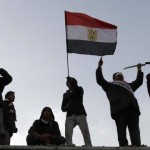A Test for the New Egypt
 There's a lot of heady talk in the US about Egypt, but let's not forget: popular protests in the Mideast don't usually generate stable democratic regimes.
There's a lot of heady talk in the US about Egypt, but let's not forget: popular protests in the Mideast don't usually generate stable democratic regimes.
The treaty with Israel contains more than just a promise not to go to war. It contains a series of very specific commitments about Israeli security:
1) It pledges Israeli ships may use the Suez Canal
2) It recognizes the Gulf of Aqaba as an international waterway, precluding Egypt from closing access to the port of Eilat.
3) It demilitarizes the Sinai.
4) It emplaces US military observers at strategic points in the Sinai
5) It provided for normalization of relations, as a consequence of which there is direct air travel between the two countries.
There's a lot of heady talk in the US media right now, from both liberals and conservatives, about the possibilities in Cairo. We all share those hopes. But we all also ought to recognize that popular protests in the Middle East do not typically generate stable democratic regimes, and that even free elections can bring very nasty people to power, as happened in Gaza in 2005.
Here's a special request for the US and international journalists doing such impressive work under such dangerous circumstances in Egypt today. When you talk to Egyptian opposition figures, do not ask - and do not accept - generalities about accepting "all of Egypt's obligations." Ask them specifically about the individual commitments to open the Canal and maintain normal friendly relations. If they hem and haw, ask them why. Whom are they afraid of offending? Not that questioning will change anything. But it could at least provide some valuable early warnings.